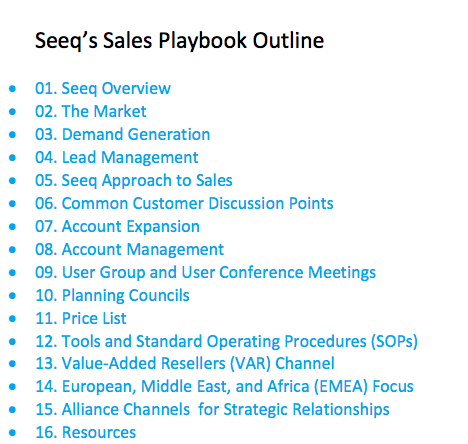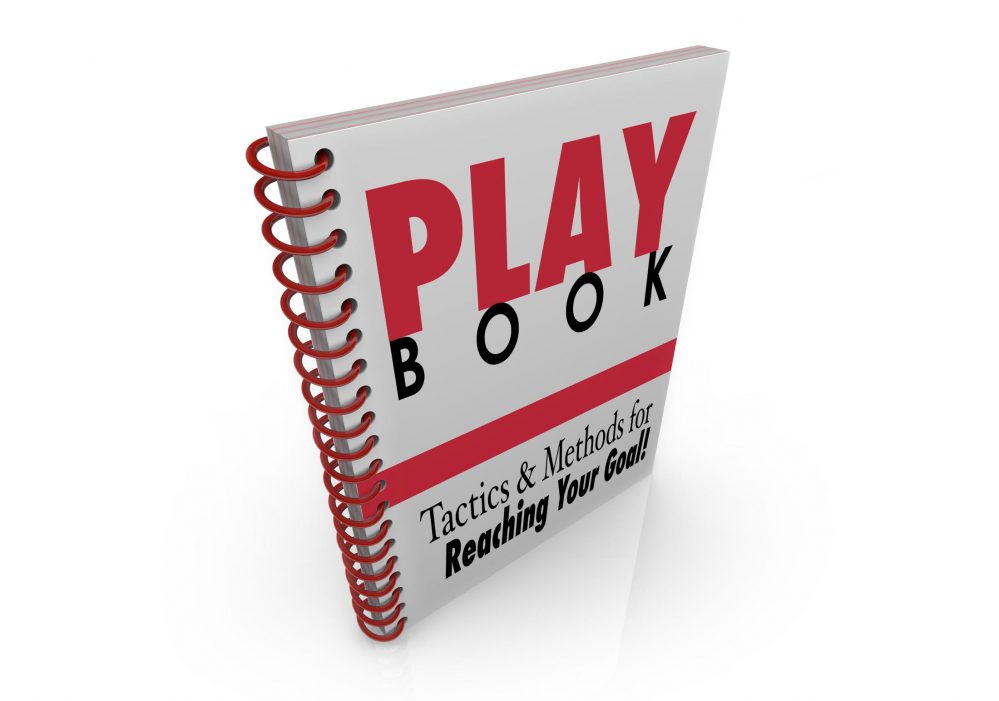The internet has hundreds of examples of sales playbooks. This post is my contribution to that effort.
A sales playbook is a tool that can be used by field sales forces, field sales executives, and inside sales teams to execute their strategies and tactics. The sales playbook is a living document that allows your organization to update the sales findings as you learn about the competition and new sales arguments as you adapt pricing and offerings. You keep all relevant information up-to-date in a sales playbook.
One benefit to using this tool is that as you scale your sales force, you can easily train new hires and bring them up-to-speed. Additionally, as your sales force learns, it’s a mechanism where they can share the results that work and don’t work. Updates are constantly added to the playbook.

Seeq’s Detailed Sales Playbook
- Seeq Overview
- About Seeq
- Seeq Descriptions
- Seeq Architecture
- Seeq Workbench
- Seeq Organizer
- The Market
- Market Drivers
- Manufacturing Data Challenges
- Value of Analytics
- Use Cases
- Target Prospect Firmographics
- Target Personas
- Demand Generation
- Overview
- Events
- Webinars
- Public Relations (PR) Objectives
- Account Receivables (AC) Objectives
- Advertising
- Website
- Social Media
- Direct Marketing
- Lead Management
- Lead Life Cycle
- Lead Assignment
- Lead Qualification
- Email Templates
- Call Scripts
- Seeq Approach to Sales
- Introduction
- Sales Roles, Coordination, and Meetings
- Roles
- Coordination Models
- Meetings
- Launch. Extended Experience. Strategic Agreement (LEESA) Sales Model
- Land
- Land Pipeline Metrics
- Negotiation Levers
- Key Plays for Land
- Extended Experience (Expand)
- Expansion Metrics
- Negotiation Levers
- Key Plays for Expand
- Strategic Agreements
- Key Customer Value Proposition
- Customer Benefits
- Negotiation Strategies
- Common Customer Discussion Points
- Seeq Value Proposition and Deployment Benefits
- Problem / Solution Overview
- Use Cases and Solution Briefs
- Seeq FAQ
- Competition
- Dealing with Objections
- Terminology to Avoid
- Account Expansion
- General Approach
- Launch Plans
- Frequency of Interactions
- Piwik / Matomo Data
- Additional Professional Services
- Application Development
- Internal User Groups and Communications
- Customer as Speakers and Reference Cases
- Stalled Accounts
- Account Management
- Approved Target List (ATL) and Approved Customer List (ACL)
- Evolving Role of Seeq Account Management
- Account Plans
- Customer Success
- ROI Audits / Cost of Ownership
- User Group and User Conference Meetings
- Introduction
- Virtual
- Regional
- Worldwide
- Planning Councils
- General Approach
- Strategic Planning Council
- Technical Planning Council
- Price List
- Tools and Standard Operating Procedures (SOPs)
- Seeq Guidelines for the Use of SalesForce.com
- Account Plans and Tracking
- PowerPoint Management
- Proposal Management
- Value-Added Resellers (VAR) Channel
- European, Middle East, and Africa (EMEA) Focus
- Alliance Channels for Strategic Relationships
- Identification of Seeq Needs
- Assessment and Selection of Potential Alliance Partners
- Diligence
- Execution Planning
- Negotiation
- Execution
- Relationship Management and Evaluation
- Resources List
I cannot say that Seeq’s Sales Playbook is the best example out there, but it is coming together as we grow and provides a focus for us to tune our process. There are companies and tools that can be exploited for building a sales playbook. Sometimes, though, the journey is more important than the product.
Feel free to use our outline and detailed document to develop a sales playbook for your organization.
Share this Post

